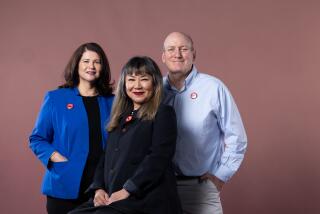R.S.V.P. : Bringing a Minority Focus to United Way
- Share via
As the new chairman of United Way, Dr. Herbert L. Carter hopes the 70-year-old organization, which raised $88 million last year, will cease to be so reliant on corporate philanthropy and instead find ways for ethnic minorities who collectively constitute a majority to make contributions. “After all, it is their agency, too,” Carter says.
Carter, 56, executive vice chancellor of the California State University system, this month became the first minority volunteer and the first public sector executive to chair United Way.
On Sunday he will be honored by United Way’s three major ethnic volunteer councils--the Black Partnership Development Council (which Carter organized), the Asian Pacific Research and Development Council and the Hispanic Volunteer Council--at a salute at the California Afro-American Museum in Exposition Park.
The corollary to minority population growth in Los Angeles, Carter says, is to involve minorities in the process of deciding how community priorities should be addressed in terms of dollars allocated and in a manner reflecting reality.
Directing Allocations
For instance, he says, there are “no United Way agencies that are exclusively concentrating on AIDS.” He also hopes to use his position to focus allocations toward the homeless, substance abuse, child care, gang violence, illiteracy, teen-age pregnancy and parenting skills.
He strongly wants to fight illiteracy. “One of six people in Los Angeles is functionally illiterate in terms of English. I think multilingualism should be applauded, but it is essential that people be able to read, write and converse in English if they are going to make it through the educational process.”
Adds Carter: “As the makeup of this community changes, we have to do everything we can to see that the leadership potential of the individual in these diverse minority groups is given a chance to flourish. . . . If not, we will have a paternalistic society in which the white minority is responsible for providing leadership to address the needs of the majority of minorities.”
Says Carter: “In Los Angeles we probably raise more than any other place in the world (for charity). But, if we look at the level of giving compared with per-capita giving in other cities, Los Angeles should be raising $200 million a year for United Way--easy.” What he observes, however, is “a highly segmented community” in which the entertainment and movie industries, churches, social groups and communities such as the Chinese that help themselves work independently. “While that is good, how do you broaden community responsibility, how do you function as an entity?”
Arkansas Native
Carter, who golfs every weekend, gardens, reads spy thrillers and has a doctorate in public administration from USC, grew up in Little Rock, Ark. His father worked for Navy ordnance; his mother was a housekeeper and cook. He graduated in 1956 from Arkansas Agriculture, Mechanical and Normal College (now the University of Arkansas at Pine Bluff). “My parents were not educated people, but they were good people; they gave me a set of values that have served me well,” Carter says.
After his first job in Los Angeles at the post office, Carter worked with juvenile delinquents and eventually became executive director of the Los Angeles County Commission on Human Relations. In 1973, he ran for Mayor Tom Bradley’s former City Council seat, losing to David Cunningham.
Says his wife, Virginia, a real-estate probate referee for California who is studying for her BA at Cal State Dominguez Hills: “Herb has always focused on trying to improve those people who are disadvantaged. He has the general attitude that if people are given an opportunity, they will uplift themselves. That’s Herb in a nutshell.”
More to Read
Sign up for Essential California
The most important California stories and recommendations in your inbox every morning.
You may occasionally receive promotional content from the Los Angeles Times.













